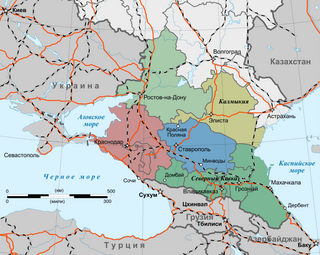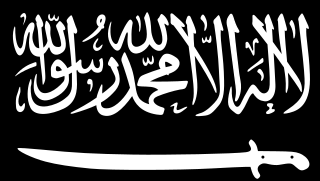
Karachay-Cherkessia, officially the Karachay-Cherkess Republic, is a republic of Russia located in the North Caucasus. It is administratively part of the North Caucasian Federal District. As of the 2021 census, Karachay-Cherkessia has a population of 469,865. Cherkessk is the largest city and the capital of the republic.

The North Caucasus, or Ciscaucasia, is a region in Eurasia governed by Russia. It constitutes the northern part of the wider Caucasus region, which forms the natural border between Europe and West Asia. It is bordered by the Sea of Azov and Black Sea to the west, the Caspian Sea to the east, and the Caucasus Mountains to the south. The region shares land borders with the South Caucasus countries of Georgia and Azerbaijan. Krasnodar is the largest city within the North Caucasus.

Kabardino-Balkaria, officially the Kabardino-Balkarian Republic, is a republic of Russia located in the North Caucasus. As of the 2021 Census, its population was 904,200. Its capital is Nalchik. The area contains the highest mountain in Europe, Mount Elbrus, at 5,642 m (18,510 ft). Mount Elbrus has 22 glaciers that feed three rivers — Baksan, Malka and Kuban. The mountain is covered with snow year-round.

The Kabardians or Kabardinians are one of the twelve major Circassian tribes, representing one of the twelve stars on the green-and-gold Circassian flag. They are also commonly known by the plural terms Kabardin, Kebertei, or Kabarday. Along with the Besleney tribe, they speak a distinctive dialect of the Circassian. Historically the Kabardians lived in Kabardia, a region of the north Caucasus. In modern times the Kabardians live mostly in the Russian republic of Kabardino-Balkaria, which partly corresponds to the historic region.

Karachay–Balkar, or Mountain Turkic, is a Turkic language spoken by the Karachays and Balkars in Kabardino-Balkaria and Karachay–Cherkessia, European Russia, as well as by an immigrant population in Afyonkarahisar Province, Turkey. It is divided into two dialects: Karachay-Baksan-Chegem, which pronounces two phonemes as and and Malkar, which pronounces the corresponding phonemes as and. The modern Karachay–Balkar written language is based on the Karachay–Baksan–Chegem dialect. The language is closely related to Kumyk.

The 2005 raid on Nalchik was a raid by a large group of Islamic militants on Nalchik, in the Kabardino-Balkar Republic (KBR) of southern Russia, on 13 October 2005.
Decree time refers to the changes introduced to the Soviet Union time system by a Sovnarkom decree of 16 June 1930. By this decree, all clocks in the Soviet Union were permanently shifted one hour ahead at 00:00 on 21 June 1930 everywhere in the Soviet Union. Applicability of this decree was further extended by two other decrees in 1930 and 1931. The practice was further extended, and its legal basis was amended, in 1980.

The United Vilayat of Kabarda-Balkaria-Karachay, also known as Vilayat KBK, was a militant Islamist Jihadist organization connected to numerous attacks against the local and federal security forces in the Russian republics of Kabardino-Balkaria and Karachay-Cherkessia in the North Caucasus. Vilayet KBK has been a member of the Caucasus Emirate group since 2007.

Russia, the largest country in the world, has international land borders with fourteen sovereign states as well as 2 narrow maritime boundaries with the United States and Japan. There are also two breakaway states bordering Russia, namely Abkhazia and South Ossetia. The country has an internationally recognized land border running 22,407 kilometres (13,923 mi) in total, and has the second-longest land border of any country in the world, after China. The borders of the Russian Federation were mostly drawn since 1956, and have remained the same after the dissolution of the Soviet Union. In 2014, Russia annexed Ukraine's Crimean peninsula in a move that remains internationally unrecognized.

The Circassian Day of Mourning or the Day of Mouning for the Victims of the Circassian Genocide is mourned every year on 21 May in remembrance of the victims of the Russo-Circassian War and the subsequent Circassian genocide by members of the Circassian diaspora. The choice of the date is due to the fact that on 21 May 1864, General Pavel Grabbe held a military parade in the what is now Krasnaya Polyana in honor of the victory in the Battle of Qbaada.

Haji Allahshükür Hummat Pashazade is the Sheikh ul-Islam and Grand Mufti of the Caucasus which includes the Republic of Azerbaijan, the Republic of Georgia, and Dagestan, Kabardino-Balkaria, Ingushetia, Chechnya, Karachay–Cherkessia, and Adygea in the Russian Federation. He is also the chairman of the Religious Council of the Caucasus.

The insurgency in the North Caucasus was a low-level armed conflict between Russia and militants associated with the Caucasus Emirate and, from June 2015, the Islamic State, in the North Caucasus. It followed the official end of the decade-long Second Chechen War on 16 April 2009. It attracted volunteers from the MENA region, Western Europe, and Central Asia. The Russian legislation considers the Second Chechen War and the insurgency described in this article as the same "counter-terrorist operations on the territory of the North Caucasus region".
Guzeriplia is a genus of flies in the family Dolichopodidae. It is known from southern Russia, Georgia, China and Turkey. It is considered a synonym of Chrysotimus by some authors, but is considered a separate genus by others.

Circassian nationalism is the desire among Circassians worldwide to preserve their genes, heritage and culture, save their language from extinction, raise awareness about the Circassian genocide, return to Circassia and establish a completely autonomous or independent Circassian state in its pre-Russian invasion borders.
The August 2004 Moscow metro bombing took place at about 20:17 MSK on 31 August 2004, when a female suicide bomber blew herself up outside Rizhskaya metro station, killing at least 10 people and wounding 50.
Balkar and Karachay nationalism is the national sentiment among the Balkars and Karachai. It generally manifests itself in:

Kazbek Gekkiyev, a Russian TV news presenter and journalist for the All-Russian State Television and Radio Broadcasting Company (VGTRK) in Nalchik, Kabardino-Balkaria, Russia, was shot three times in the head and killed by a gunman outside of his workplace. The gunmen are believed to be linked to the Islamic insurgency in the North Caucasus. He was the seventh journalist killed in the North Caucasus in ten years in connection to his work.

The Turkvision Song Contest 2015 was the third edition of the Turkvision Song Contest, which took place in Istanbul, Turkey; and organised by Turkish Music Box Television (TMB). A total of twenty-one Turkic regions, which have either a large Turkic population or a widely spoken Turkic language, participated in the contest, as well as one Turkic ethnic groups who do not have a defined region. Several regions of the Russian Federation were on the preliminary participation list for the contest, but were later forced to withdraw due to the Ministry of Culture banning Russian regions from the TURKSOY organisation. There was no semi-final this year, whilst the final took place on 19 December 2015.

The 2019 Russian regional elections took place on 8 September 2019 for the election of governors in 19 subjects, among which 16 by direct votes and 3 by indirect votes, and of legislatives bodies in 13 subjects.














